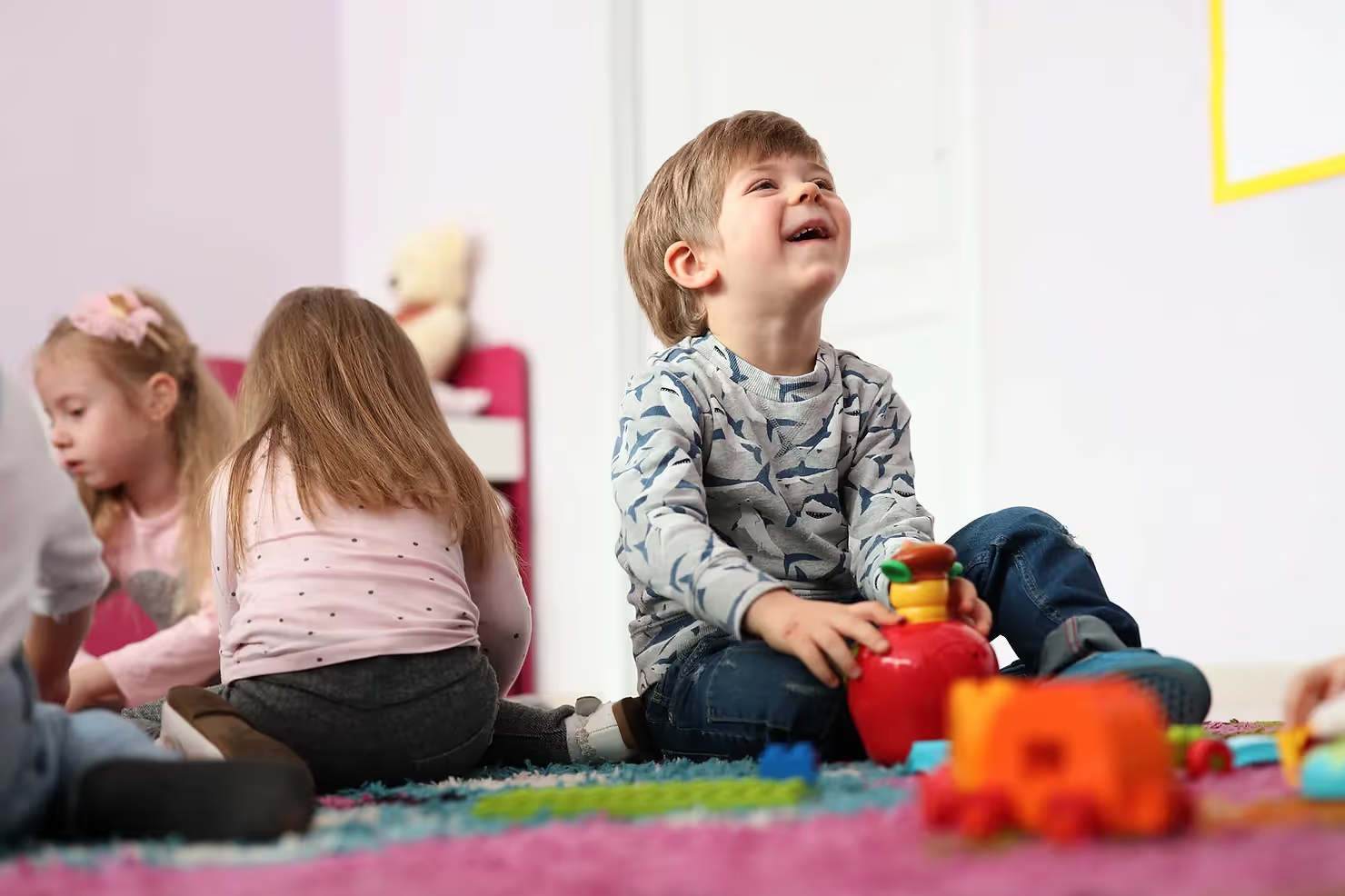
Coral Care content is reviewed and approved by our clinical professionals so you you know you're getting verified advice.
Find effective support for developmental delays, quickly.



Concerned about your child's development?
Our free screener offers guidance and connects you with the right providers to support your child's journey.
Play of all types, whether parallel play or solitary play, is powerful. With fun games and activities, your little one learns not only how to entertain themselves, but interact with the world around them!
But tummy time and rattle shaking aren’t meant to last forever, and you’ll notice that your child’s playtime begins to look different as they age. Implementing age-appropriate activities and educating yourself about the stages of play development can help your child stay on track for healthy development.
Play in early childhood is critical to your child’s development as it helps your child develop cognitively, socially, emotionally, and physically. In this article, we’ll take a look at the 6 stages of play development in early childhood, and learn about play styles that may indicate that your child needs additional development support.
Stages of Play Development In Early Childhood
The stages of play development are important to monitor as a child grows and develops. A four-year-old child isn’t going to play in the same ways that a 3-month-old baby does, so it’s important that you find play activities that will support your child at every age to encourage healthy development.
To better understand how little ones play at all of the stages in their life, we’ll take a look at the 6 different stages of play development in early childhood.
Unoccupied Play (0 - 3 months)
During the early stage of infancy, everything is shiny and brand new. While babies at this age can’t move around too much on their own, they’re still able to engage in unoccupied play, meaning they’ll start to explore themselves and their immediate surroundings.
Common Activities:
- Splashing in water during bath time
- Waving their hands
- Grabbing their toes
- Kicking their legs
- Watching how their body and the objects/people around them move
- Starting to grab and move around toys
Solitary Play (3 months - 2 years)
The next play development stage occurs when young children learn how to entertain themselves without their parents. While this phase may seem like your child is lonely or isolating themselves, solitary play is great for letting children further explore their surroundings, practice key motor skills, and develop cognitively.
Common Activities:
- Flipping pages in a book on their own
- Playing with blocks and other toys on their own
- Doing basic arts & crafts (e.g., coloring, finger painting) on their own
Onlooker Play (2 years)
During this phase, your little one will discover the power of observation and spend more time watching others play and interact with the world around them. Some parents worry that their child is merely observing other kids doing fun activities rather than participating in them themself. There’s no need to worry–this behavior does wonders for children’s development at this age, helping them to learn from others by watching and listening.
Just because your kid isn’t jumping in during group playtimes, doesn’t mean you should stop group sessions altogether or isolate them–in fact, do the opposite! Onlooker/spectator play is critical in showing your child good social skills that they can soon start practicing.
Common Activities:
- Watching others play instead of joining in
- Standing behind another child as they color and paint. They may point and offer suggestions (i.e. “Use the blue one.”)
- Clapping and encouraging others
- Asking questions and giving suggestions to other kids, but not doing more
Parallel Play (2+ years)
During this phase, children will play side-by-side but not with each other. Even though they’re not directly interacting at this stage, parallel play is very beneficial and helps children practice their cognitive skills, motor skills, and more, helping them prepare for the next phase.
Common Activities:
- Dancing alongside other kids
- Playing with toys on the ground alongside others
- Arts & crafts playdates where children can still be together, but create separately
- Playing alongside other children in a sandbox
Associative Play (3 - 4 years)
The transition from parallel to associative play can seem drastic. All of a sudden you’ll notice your child go from wanting to play independently, to becoming more interested in playing with other children. Your toddler will begin to put into practice all the social skills they’ve started to learn so far and engage more with the people around them.
However, you’ll notice that during playtime, your 3 to 4-year-old still may not work towards the same goal as the other kid(s) they’re playing with. This is to be expected as they begin to explore how to socialize.
Common Activities:
- Playing pretend with other children, but playing different characters or people that don’t work together for a common goalsome text
- (e.g., Having teatime, but feeding different stuffed animals)
- Playing with the same blocks, but building separate structures
- Playing on the playground with other children, but doing different activities some text
- (e.g., One child likes the slide, the other likes to go down the fire pole)
Cooperative Play (4+ years)
In this last stage, your child will take the big leap and begin interacting with others even more! This means that your kid won’t only interact with their playmates, but begin to work together to accomplish the same goal. While this is a fun stage, it can come with conflict as children learn how to share, take turns, and follow rules. Make sure to step in if needed, offering solutions and valuable teaching lessons.
Common Activities:
- Playing tag, hide and seek, and other group games with rules
- Working together with others to complete a puzzle
- Creating a choreographed dance with friends
- Building forts with other children
- Helping you make and bake cookies in the kitchen
- Playing pretend and working toward the same goal as others (e.g., The knights work together to slay the dragon.)
Play Styles and Developmental Signs to Watch For
To encourage play development, it’s important that you make playtime a priority. Find the best age-appropriate activities for your kid and spend some time learning and having fun together.
However, if you notice that your child is struggling during playtime, missing milestones, and using different play styles than other kids their age, it may be a sign that your child needs additional developmental support.
Here are some common signs and play styles you should watch for:
- Showing no interest in other people or children their age by age 3
- Issues accomplishing basic activities due to physical or cognitive limitations
- Issues regulating their emotions as they age & getting easily frustrated during playtime
- Loses skills and abilities they once had
- Missing developmental milestones (e.g., physical, social, cognitive, etc.)
- Remaining in one play development stage for longer than recommended
If you have any concerns about your child’s development or overall health, it may be time to schedule an evaluation with an Occupational Therapist.
Check Out Our Developmental Guides For More Information
Could your Child Use Developmental Support?
Finding the right healthcare provider depends on several different things, starting with the difficulties or delays your child is experiencing. Pediatric physical therapists, speech-pathology therapists, and occupational therapists can help children succeed in their daily lives.
At Coral Care, we help parents find the best pediatric specialist for their child, and believe that care should be easy, accessible, and affordable. Think your child could benefit from developmental care? Schedule an evaluation to start getting your kid the developmental support they deserve!


.avif)


.avif)